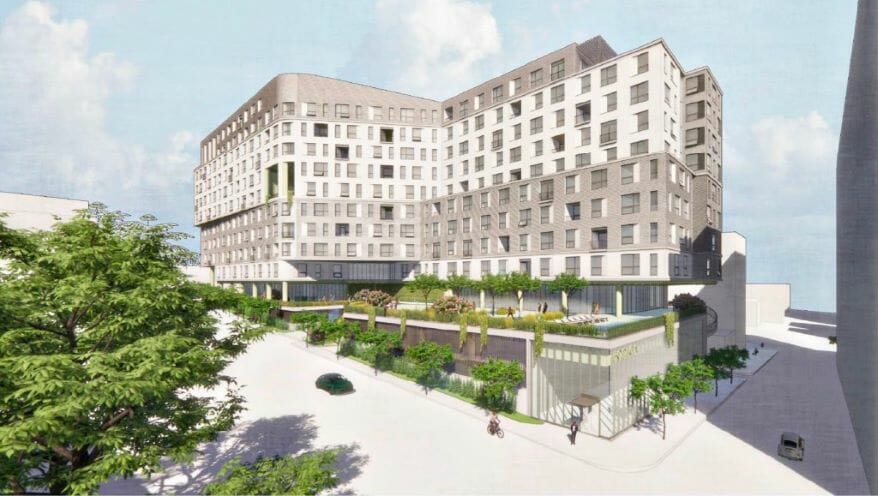- Home | News & Issues |
- Waldo and Plaza-area Projects Push for Port KC Tax Breaks
Waldo and Plaza-area Projects Push for Port KC Tax Breaks Big Housing Projects Draw Scrutiny
Published July 19th, 2023 at 10:00 AM
Above image credit: The 4711 Belleview project is proposed near the Country Club Plaza, at the former site of JJ’s Restaurant. The developer would receive a tax break of about 62.5% of its property taxes over 25 years. (Josh Merchant | The Beacon)A last-minute notice that the Port Authority of Kansas City would be considering tax breaks for a set of controversial housing developments at its July 17 board meeting drew a crowd of irate school leaders, neighborhood residents and business owners.
They arrived on Zoom and in person with familiar concerns. Critics complained about a lack of transparency and community engagement. They said the “affordable housing” promised by the developer was not affordable to people like teachers. And they raised concerns about whether Port KC was giving away too much money to a developer, at the expense of their kids’ schools.
Officials from Kansas City Public Schools (KCPS), including school board member Jamekia Kendrix, were furious that they were only given one day to evaluate the projects and prepare for the Port KC board meeting. Ordinarily they would have been given a week. This time they learned about the projects hours before a destructive storm knocked out power and internet across much of Kansas City.
“It’s very rare that we have board members testifying about projects,” Kathleen Pointer, the senior policy strategist for KCPS, said at the meeting. “We are extremely concerned about the lack of engagement and, frankly, the lack of respect for the taxing jurisdictions in this process.”
In the end, the board voted in favor of the first of three required approvals for a housing development in Waldo that had previously been rejected for incentives by another agency.
One of the more controversial projects, a 100% market-rate housing development in the Country Club Plaza area requesting a 25-year tax break, was tabled for discussion at a later date.
The board also approved a policy that members said would bring fiscal transparency to an economic development agency that grants millions of dollars of property tax breaks to developers every year. But that gesture provoked more criticism from KCPS, whose leaders say it’s not up to par with what other agencies are doing.
Waldo Project Resurfaces at a Different Agency
The project that received its first approval is a housing development proposed at 74th Street and Broadway, which would give a new home to the Waldo restaurant The Well.
The project is familiar to Waldo residents and others. Its developers first approached RideKC Development Corp. requesting tax incentives last fall.

At the time, developers were requesting 25 years of a 75% property tax break, contending that it met transit-oriented criteria required for consideration of tax incentives by the Kansas City Area Transportation Authority (KCATA) — the parent agency of RideKC Development Corp. Those included wide sidewalks, ground-level retail and rest areas for transit passengers.
RideKC Development Corp. recommended approval of the project. The KCATA board, however, voted not to pursue the project.
“The KCATA didn’t fully approve the incentive package, mainly because the development, which is a great development, fell out of line with our policies,” Michael Riley, the KCATA’s director of transit-oriented development and transit-oriented communities, told The Beacon this week.
He said the KCATA wanted to ensure that it used its transit-oriented incentives and financial tools “in areas of great need.”
Deputy CEO Dick Jarrold said there was also a question of whether the developer actually needed tax incentives from the KCATA.
A primary concern among critics of tax incentive programs in Kansas City is that the presence of several players in the game encourages developers to shop around among agencies. Port KC CEO Jon Stephens said at the board meeting that such a scenario wasn’t the case with the Waldo project, because the developers had changed their application significantly.
The developer, EPC Real Estate, is requesting a smaller tax incentive than before, and 20% of the apartments will be set aside as “affordable” at 60% of median family income. Rents would be about $1,075 for a studio, $1,230 for a one-bedroom unit and $1,400 for a two-bedroom apartment.
At the Port KC board meeting, several neighborhood leaders, including Chelsea Kapka, the executive director of the Waldo Area Business Association, and Angie Lile, a leader in the Waldo neighborhood association, said the developer has not communicated well with the community. Lile said that when the developer presented the first version of the project to the neighborhood association a year ago, the resounding feedback was that residents did not support tax incentives.
“Incentives are hurting our school district overall,” Lile said. “This is not going to give back to our school district in the way that they’re saying.”
Pointer, representing the school district, repeated her concerns with the lack of collaboration with the taxing jurisdictions and neighborhood groups. She also said that Kansas City needs affordable housing at lower rent levels than the prices proposed by the developer.
Another Proposal Tabled After Meeting with the Mayor
The other housing development that appeared on the agenda for discussion on July 17 was a project at 47th Street and Belleview Avenue in the Country Club Plaza area.
The project, called 4711 Belleview, proposes to build 319 market-rate units, with rents projected for $1,336 for a studio, $1,766 for a one-bedroom apartment and $2,749 for a two-bedroom apartment. The developers are requesting a 25-year tax incentive, starting at 70% of property tax exempted in the first year, gradually decreasing to 55% by the 25th year.
Port KC’s consideration of a tax incentive for high-cost apartments in a neighborhood that has received considerable investment for the past century immediately raised red flags for critics.
Stephens told The Beacon that considerable landscaping and utility work needs to be done at the site.
“While the geography may appear to be more high-end, this is the site where the JJ’s fire occurred,” Stephens said. “There’s some pretty extraordinary land assemblage, pretty extraordinary utility and earth movement to get a multifamily project on this site … That’s what really raised the cost of this project and therefore created some structural gap that at least we would consider.”

Both the Plaza project and the Waldo74Broadway project were brought to Port KC at the request of “multiple folks within city leadership,” Stephens said.
City Manager Brian Platt was unavailable for comment prior to publication, and Assistant City Manager Melissa Kozakiewicz told The Beacon that she had “no information” about these projects.
A representative of Mayor Quinton Lucas did not respond to multiple requests for information about these proposals, and it is unclear whether he supports them.
Immediately following The Beacon’s interview with Stephens, he was scheduled for a last-minute one-on-one meeting with Lucas. Later that day, Stephens announced at the Port KC board meeting that the 4711 Belleview project would be tabled for discussion at a later date.
Port KC’s development focus in recent years has been on the 45-acre Berkley Riverfront. The agency’s venture into subsidized developments in other parts of the city has been questioned in the past by the Kansas City Council.
A city ordinance signed by Lucas in 2019 established the boundaries of “port districts,” where Port KC is authorized to do business. These include areas within one mile of an airport, a railroad or the Missouri and Blue rivers. These port districts cover the Berkley Riverfront but not Waldo or the Country Club Plaza.
However, because the ordinance was never approved by the Missouri Highways and Transportation Commission, it is not binding.
Port KC Will Implement a Third-party Audit
This week’s Port KC meeting included a discussion about third-party “but-for” financial analysis — a familiar conversation for people who follow the tax incentive debate.
For this kind of analysis, an independent financial expert studies the project’s finances to calculate how much of a tax incentive is necessary for a project to be financially feasible. In other words, “but for” the incentive, the project would not be possible.
KCATA announced this month that it would begin conducting third-party financial analysis for developments under its consideration, leaving Port KC as the only development agency in Kansas City that does not seek an outside opinion.
Instead, Port KC conducts its own analysis in-house — a process that has been criticized by KCPS, as well as the Jackson County Community Mental Health Fund, for years. Those two taxing jurisdictions and others believe that, without an independent analysis to verify Port KC’s numbers, the agency could be giving out unnecessarily large tax breaks that come at the expense of government services.
Port KC passed a compromise policy at Monday’s meeting — instead of receiving an independent financial analysis, the agency will hire a third-party auditor to review its own analysis for multifamily housing projects.
“I believe we have a strong robust internal analysis system, but we do support a third-party audited analysis process, and we think we help instill additional confidence in that analysis,” Stephens said at the board meeting.
The compromise failed to satisfy critics who believe Port KC should be held to the same standard as other development agencies in Kansas City, including the KCATA and the various agencies under the Economic Development Corp. of Kansas City (EDC). Without consistent independent reviews, developers will shop around at the various agencies to see which one is willing to give them the biggest incentive with the least restrictions, critics contend.
“A third-party financial audit is not what the school district is asking for,” Pointer said at the meeting. “We expect a third-party independent financial analysis… The only way to truly cut down on incentive shopping in Kansas City is for the Port to operate in the exact same way as the EDC.”
Josh Merchant is a local government reporter with The Kansas City Beacon, where this story first appeared. The Beacon is a member of the KC Media Collective.

Tags: affordable housing • Country Club Plaza • Housing • port kc • Tax incentives • The Beacon • Waldo
Like what you are reading?
Discover more unheard stories about Kansas City, every Thursday.
Thank you for subscribing!
Check your inbox, you should see something from us.
Ready to read next
The Way We Were: Mapping Historic Landmarks in Kansas City
The City of Fountains has More Than 300 Sites on the National Register of Historic Places
Read StoryRelated Stories
Kansas City-area Politicians Pick Between War on Drugs or Treatment When Spending Opioid Settlement Cash
Cities and counties in the metro are starting to spend windfalls from legal settlements with companies that made, shipped and sold opioids. While some prioritize law enforcement efforts to reduce drugs on the street, others try to attack demand by getting people into treatment.
by Suzanne King, The Beacon | 04-17-2024
With a Casino on Their Phones, More Kansas City Gamblers Risk Addiction
Addiction experts warn that sports betting apps and in-game wagering pose a particularly addictive temptation that can add up to trouble for problem gamblers. Expect to see tens of millions of dollars wagered in Kansas on the Super Bowl.
by Suzanne King, The Beacon | 02-09-2024


